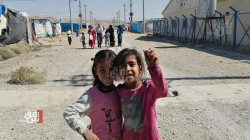Population explosion risks loom in Iraq with more than a million births annually

Shafaq News / Within the landscape of Iraq's burgeoning population, experts emphasize a crucial aspect often overlooked: the imperative need for controlled family planning. As the nation's population exceeds 43 million, with half poised at the age of marriage and childbirth, the call for structured family size management resonates profoundly.
This pressing concern, as highlighted by the Iraqi Ministry of Planning, underscores the necessity of addressing the topic to avert impending social, economic, and demographic challenges.
Population growth increase
Abdul Zahra Al-Hindawi, the ministry's spokesperson, noted, "The annual population growth in Iraq exceeds a million individuals, which is natural given the population size and does not constitute a population explosion."
Al-Hindawi, speaking to Shafaq News Agency, highlighted, "A decline in fertility rates and the annual growth rate over the last few decades, which stood at over 3% in 2011 and 2012, has currently decreased to 2.5%."
He further explained, "Despite the decline in the population growth rate, there are still continuous population increases, albeit cumulatively. Southern governorates, however, witness a slight increase in fertility rates compared to other ones."
"The Ministry of Planning is not considering legislation to enforce birth control measures but rather formulating strategies and policies for family planning. The aim is to absorb this population increase and transform it from developmental burdens into active developmental catalysts”, Al-Hindawi added.
He continued, "This is stipulated in the National Document for Population Policy released by the Ministry of Planning this year, ensuring that family planning guarantees a state of population stability and a reduction in growth rates."
Family planning
Women and children's rights activist, Ana’am Al-Hamadani, believes that "there is a need for family planning, especially among low-income individuals residing in economically disadvantaged informal settlements."
Al-Hamdani emphasized that "affluent and wealthy families have begun reducing family size due to the economic and social conditions prevalent in the country."
Shortfall in accommodation requirements
Economic expert Abdulrahman Al-Sheikhly stated that "Iraq's population grows by 1.2 million annually, and it is anticipated to reach 50 million by the year 2030."
He informed Shafaq News Agency, "This increase necessitates the provision of services in various sectors including education, healthcare, water, electricity, childcare facilities, youth support centers, women's empowerment, and other pertinent areas, which calls for a framework to manage this population growth."
Religious perspectives on family planning
Furhan Al-Saadi, a professor at the Islamic seminary, explained, "Family planning lies within the realm of the family, adhering to methods consistent with Islamic law. For instance, women have the right to limit childbirth if they are unwell."
He emphasized to Shafaq News Agency, "It is not permissible for the government to dictate family planning measures per Islamic law."
Similarly, Wameedh Al-Ghareebi stated, "In Islamic jurisprudence, it is encouraged to have a larger family. Iraq's governance system is not under the concept of (Guardianship of the Jurist) as in Iran, where the government issues religious decrees on family planning."
Al-Ghareebi further elucidated, "If the government decides to enact legislation for family planning to regulate the country's affairs and its citizens, and if the religious authorities do not find this law in violation of Islamic principles and deem it necessary to apply government laws, then compliance becomes imperative, albeit within the confines of personal freedom."
He pointed out, "In Islamic law, it is not obligatory for women to bear children, nor is it mandatory for them to use contraceptives or the opposite, even if their husbands request it. Instead, it relies on mutual agreement between spouses."
"The risks associated with overpopulation emerge when the father cannot fulfill his responsibilities regarding upbringing and education, leading to increased begging, poverty, illiteracy, and potentially social and economic issues. Thus, the decision lies with the parents, considering their intellectual, physical, and financial capacities."
Concluding, he noted, "Life in previous times might have differed from the complexities of today's society. Therefore, the current situation might be more challenging, requiring careful consideration by parents before childbirth, avoiding leaving matters to chance."



